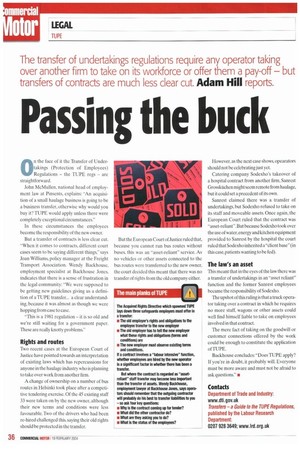Passing the buck
Page 38

If you've noticed an error in this article please click here to report it so we can fix it.
The transfer of undertakings regulations require any operator taking over another firm to take on its workforce or offer them a pay-off — but transfers of contracts are much less clear cut. Adam Hill reports.
On the face of it the Transfer of Undertakings (Protection of Employees) Regulations the TUPE regs are straightforward.
John McMullen, national head of employment law at Pinsents, explains: An acquisition of a small haulage business is going to be a business transfer, otherwise why would you buy it? TUPE would apply unless there were completely exceptional circumstances."
In these circumstances the employees become the responsibility of the new owner.
But a transfer of contracts is less clear cut. "When it comes to contracts, different court cases seem to be saying different things,says Joan Williams, policy manager at the Freight Transport Association, Wendy Backhouse. employment specialist at Backhouse Jones. indicates that there is a sense of frustration in the legal community: "We were supposed to be getting new guidelines giving us a definition of a TUPE transfer... a clear understanding, because it was almost as though we were hopping from case to case.
"This is a 1981 regulation it is so old and we're still waiting for a government paper. These are really knotty problems."
Rights and routes
Two recent cases at the European Court of Justice have pointed towards an interpretation of existing laws which has repercussions for anyone in the haulage industry who is planning to take over work from another firm.
A change of ownership on a number of bus routes in Helsinki took place after a competitive tendering exercise. Of the 45 existing staff 33 were taken on by the new owner, although their new terms and conditions were less favourable. Two of the drivers who had been re-hired challenged this, saying their old rights should be protected in the transfer. But the European Court of Justice ruled that, because you cannot run bus routes without buses, this was an "asset-reliant" service. As no vehicles or other assets connected to the bus routes were transferred to the new owner. the court decided this meant that there was no transfer of rights from the old company either. However, as the next case shows, opearators should not be celebrating just yet.
Catering company Sodexho's takeover of a hospital contract from another firm, Sanrest Grosskfichen might seem remote from haulage, but it could set a precedent of its own.
Sanrest claimed there was a transfer of undertakings, but Sodexho refused to take on its staff and moveable assets. Once again, the European Court ruled that the contract was "asset-reliant".But because Sodexho took over the use of water,energy and kitchen equipment provided to Sanrest by the hospital the court ruled that Sodexho inherited a "client base" (in this case, patients wanting to be fed).
The law's an asset
This meant that in the eyes of the law there was a transfer of undertakings in an -asset reliant" function and the former Sanrest employees became the responsibility of Sodexho, The upshot of this ruling is that a truck operator taking over a contract in which he requires no more staff, wagons or other assets could well find himself liable to take on employees involved in that contract.
The mere fact of taking on the goodwill or customer connections offered by the work could be enough to constitute the application of TUPE.
Backhouse concludes: "Does TUPE apply? If you're in doubt, it probably will. Everyone must be more aware and must not be afraid to ask questions." •
Contacts
Department of Trade and Industry: www.dti.gov.uk Transfefs a Guide to the TUPE Regulations, published by the Labour Research Department: 0207 928 3649; www.Ird.org.uk






































































































































































































